Children of Destiny Books 1-3 (Texas: Children of Destiny Book 9) Read online
Page 38
Her face was white with shock and fear. How could they chant like that and kill in the next breath?
She was remembering Aslam’s hands on her throat and thinking that if he found them, which seemed likely, he’d kill them and relish doing so, and tomorrow he would pray again at dawn. She imagined all races and tribes were equally contradictory.
Her hands circled Kirk’s lean rangy waist, and she clung to him with a long racking shudder. “Sometimes I feel like the human race is doomed,” she whispered.
His anger forgotten, Kirk edged his body closer to hers and lowered his chin to the top of her head, hoping he could comfort her by his proximity. He felt her slender body quivering against his. Poor woman, she was scared to death. She kept seeking closeness with him; he kept pushing her away. She didn’t snore; he’d merely said that to annoy her.
He felt a twinge of pity for her. She was only a woman and hardly more than a child, at that. There were black bruises on her throat and arms where that bully had brutalized her. Never before had she known the terrors of war, of murder, of death. He thought it almost heroic that she’d held up so well in captivity.
On the whole he’d never had much use for women. It was part of the reason he distrusted the powerful feelings she aroused in him with just a look, a word, a touch. In his experience, women were troublemakers, the lot of them. Hadn’t his mother, whom he’d adored, run off with a lover and abandoned him without so much as a goodbye when he was just a kid? She’d broken his heart and taught him that no female could ever be trusted. His father hadn’t been much good at anything after she’d gone, either. What with his old man’s gambling and drinking, the family had ended up with nothing but a few scrap acres of their once sizeable ranch. Then his father had gambled even that away and left too. Their family pride had been obliterated. Kirk’s baby sister, Megan, had grown up half-wild, and if ever there were a female born to get herself into jams he was supposed to bail her out of, it was Megan. Luckily she’d finally married Jeb Jackson, and it was Jeb’s problem to tame her now.
Kirk had become sufficient unto himself years ago. He didn’t need a woman, didn’t want one...for anything except the obvious. Unfortunately he was too sexual, and the need tormented him with an awful regularity. Because of this weakness, he had fallen in love not once but twice and had gotten his heart smashed both times. He was through with women and the games they played, through with closeness and tenderness and emotional pain. This woman might seem different than the rest, but she wasn’t.
Inside the houses, the women said their prayers silently.
Soon the chanting ended. A boy began rhythmically pounding freshly roasted coffee beans, the stone pestle hitting the side of the brass mortar like the clapper of a bell. Women, gowned in black, came out of the houses to rekindle the previous night’s fires by throwing twigs from desert bushes and dried camel dung on the embers.
Kirk groaned. “I hate camels. More than anything, I hate camels,” he muttered, puckering his nose, as the thick acrid smoke curled toward them. “I’d rather smell a ripe skunk on a hot Texas highway, anytime. Let’s eat breakfast while we can still breathe.”
Breakfast was spare—a few dates, more of the terrible camel’s milk laced with bourbon, and two thin slabs of stale, unleavened bread. When they finished eating, Dawn was still hungry, but she didn’t complain. He was bigger than she was and probably hungrier, too.
“Clean everything up,” Kirk ordered briskly. “A date seed in the dirt could mean the difference between life and death.”
Quietly she obeyed, but when she opened his satchel to put the seeds inside, she drew back astonished. The satchel bulged with an arsenal of guns, knives, wires and dynamite, but what startled her was the money. Stacks of neatly bound one-hundred-dollar bills were crammed into the bag.
“Where did you get all this money?” came her breathless question.
He looked up from his gun. “I was sent over here with a million dollars to negotiate your release,” he said tersely.
“Who sent you?”
Silence.
She picked up a packet of bills and thumbed through them. “You didn’t even try to negotiate.”
“Sure I did.” His savage gaze glittered briefly. “I negotiated with that Nouri bastard last night outside your cell when I kicked him in the guts.” Kirk tucked a gun into his belt. “I’m negotiating now.”
Her knuckles were white from the death grip on the wad of bills. What was going on? “By just taking me out in some stupid macho way, one man against hundreds. Who do you think you are, Rambo? If you’d talked to them, maybe they would have just let me go.”
“Yeah, maybe,” he agreed, his own temper flaring. “But in case you haven’t got things figured out, it’s way too late for that now, princess.”
“Oh, that’s great! Just great! We’ll probably both die because of your stupidity.”
He shot her a derisive look. “Because of yours, sister. Neither one of us would be here at all if you and your pretty pink toe shoes had stayed in New York where they belonged.”
“I bet you didn’t talk to them because you just wanted to keep all that money for yourself. You probably don’t even care if I get killed or not—so long as you get to keep the money.”
Low, harsh laughter came from his throat, but his eyes were bright pools of anger as he stared at her, his face so hard and bitter that she shifted uncomfortably. “Oh, that’s good,” he whispered roughly. “That’s good. Just what I need—a woman who reads me like a book. Get dressed, princess.” He tossed her a black bundle and a pair of sandals. “No more time for chitchat. We’re leaving.”
“Now?” Her eyes rounded with fear. “You can’t mean we’re just going to walk out—you, me and a million dollars, when they’re all outside. Aslam Nouri—”
“Now!” he ordered.
She fumbled with the bolt of black cloth, spilling it to the dirt floor. “What is this thing, anyway?” she asked as he raised a black garment just like the one he’d given her over his head. What are you putting on?”
Wordlessly he dropped the black tentlike dress that completely covered his head and body over himself. Within seconds, even the slits for his eyes were almost veiled.
“This is the veil,” he said, “known in different countries by different terms—the abeya, the chador... Originally it was designed to protect the modesty of Arab women. Lucky for us, the custom still prevails here.”
“You mean, you’re going to pretend you’re a woman, and we’re simply going to walk out...”
“No man would dare molest the honor of women under Aslam Nouri’s protection,” he murmured, with an acidic touch of irony.
She pulled the black fabric over her head and adjusted it so she could see out the slits.
“Believe me,” Kirk said, “through the centuries, men have often worn the veil for all sorts of dubious purposes—to get into harems, for assignations. If it gets us out of this jam, I for one will always be one hundred percent for the custom.”
“And have you ever used it to get into a harem or get close to an Arab girl?”
There was an awkward silence, and she suspected that he had.
“You’re awfully tall and long legged for an Arab woman,” she said dubiously, as he towered over her. “I’m surprised they didn’t find you out and cut you to ribbons.”
“So I’m good at mincing with my knees bent.”
“I never would have guessed you were a man whose talents lay in that direction.”
“Only when my life depends on it.” His patience was being stretched. She could hear it in his terse tone. “Ready, princess?”
He handed her a basket filled with coarse shirts and hand spindles and skeins of yarn to complete her disguise so that she would seem like a Bedouin woman on her way to sell handmade goods in the bazaar.
A shiver of apprehension raced icily over her flesh. No, she wasn’t ready to go out there among all those terrorists with nothing but a thin, black bit of clo
th to protect her! But as she watched Kirk stuff his satchel into a woven basket and retreat toward the rear of the stable, she dashed after him.
Outside she had to walk on her injured ankle without limping, but because she was a dancer, disciplined to perform with debilitating injuries whenever necessary, she did so with stoic valor. Because of their cumbersome veils, Kirk couldn’t see that, after only a few steps, her lips went bloodless from pain.
Armed men, with cartridge belts laced across their chests, were everywhere. Every dark male face with a hooked nose brought back her terror and a foreboding chill at the prospect of being recaptured.
Her teeth chattered with fear when Kirk made no attempt to avoid the most crowded part of the village. She could have gladly bashed him as he headed boldly for the thickest cluster of soldiers. With a flurry of flying feathers, chickens squawked and scattered before them as they walked along the dusty streets. There were donkeys and goats in the yards, the smell of roasting sheep, the scent of leafy vegetables boiling.
Men were hunkered down beside the small, adobe-colored houses shelling pistachios. Women in black, dressed exactly as Kirk and Dawn, scurried everywhere. From crude, tented stands, people were selling leather sandals and belts, trinkets, copper and pottery.
Kirk made his way through the bustling throng to a crowded fruit stand and began to bargain with the seller for two watermelons.
Watermelons! There were soldiers everywhere! Why was he stopping to bargain for watermelons?
If his mere stopping wasn’t bad enough, he made it into a long drawn-out, nerve-racking process, thumping on melons, bickering over prices. All the time he haggled, Dawn’s heart was pounding like a drum in her ears. Was his Arabic really as good as he obviously thought it was? Wouldn’t the fruit seller notice how unusually low his voice was for a woman?
At one point Aslam Nouri passed within inches of them. When his black gaze lingered full on her face, burning through the black slits that concealed her eyes, she thought surely he would sense her terror, seize them and drag them to some hidden courtyard and murder them. But his gaze left her. He turned his back and vanished into the crowd.
She could have screamed with frustration when Kirk, having bought two, began thumping a third melon, holding it close to his ear. She had the feeling that he thrived on danger, that instead of being as terrified as she was, he was exhilarated. She wanted to use his head like the melon he kept thumping and give him a pounding he wouldn’t forget.
At last he found a third melon that satisfied him, and after a lengthy exchange of verbal abuse he bought it. But he was not content to leave the market until their baskets were stuffed with melons, dates, hazelnuts and pistachio nuts. Only then did he head for the outskirts of the village, though he took a meandering route through the narrow streets, veering always toward the east, where a formidable eternity of bleak, barren country with hardly a bush or a tree stretched endlessly. There were canyons with deep caves, but they, too, were as barren as the open country.
At the edge of the village, they came to a deserted hut. Behind the house a rangy, lazy-looking young bull camel was tied to a stake.
Kirk ripped off his veil and cloak and stuffed them in his satchel, cursing roundly. “That rotten, lying cheat! May that stinking liar suffer blindness and be boiled in oil.”
“What’s wrong?”
“Just look at that miserable animal! I paid a hundred sukki for him.”
The camel’s long lashes flicked nastily at Kirk, as man and beast regarded one another with a mutual lack of regard.
“He doesn’t look so bad—for a camel.”
“I was promised three. And twice as many water bags. But never mind. We’ve got to get the hell out of here, and he’s all we’ve got.”
Quickly Kirk donned a white kaffiyeh with a black cord and the loose attire of a poor Arab. Then he picked up the camel stick leaning against the hut. Dawn started to take off her own veil, but Kirk stopped her.
“No. Stay as you are. We’ll look like a poor Bedouin and his wife on our way across the desert.
Rivulets of sweat ran down her face and her spine as the black cloth drew in the heat of the burning sun. Her leg throbbed from her ankle to her knee, and she felt faint from the heat and hunger, and from the long walk after having been locked up so long, but she made no complaint.
Kirk took the camel stick and walked over to the beast, yanking the nose rope and beating the beast in an effort to make the animal kneel. The camel stretched his neck viciously and tried to take a bite out of Kirk’s arm.
Kirk ducked and turned back to her, snarling softly, “Hey, you two will probably get along just fine. You’ve both got the same instincts.”
The remark stung, but she lowered her head and tried to ignore it.
At last, kicking and spitting, the camel knelt in the sand. “Come on over here and get on him,” Kirk commanded.
“Get on him?” The camel, who appeared in the foulest of moods, was glaring at her from between the slits of its three pairs of lashes and making ghastly snorts. “You have to be out of your mind!”
Kirk was tying their baskets and jugs and satchel onto the glowering camel while the beast whined loudly. Kirk hung a couple of goatskin water bags to the saddle. “I said get over here!” he yelled. She didn’t move an inch. “So help me if you don’t, I’ll tie you on his back.”
She moved warily to his side, and before she could argue further Kirk lifted her up and heaved her into the stiffest, most uncomfortable seat she’d ever been in. “Honey, this is going to be heaven compared to trying to walk across the desert on that ankle.”
The camel whined even louder at this fresh load and swayed back and forth in an effort to dislodge her. “Kirk!” she shrieked.
“Hang on, princess.”
When she managed to do so the beast spit nastily in Kirk’s direction.
“I don’t think he likes me,” she whispered weakly.
Kirk wrestled the reluctant beast to his feet. “Princess, he loves you. Trust me, he’s unusually affectionate for a camel.”
The camel’s lips parted; his head swiveled toward Kirk again, but Kirk hit him with his stick. “Save your strength for the desert, lover boy.”
Kirk’s eyes studied the burning desolation of shifting sand dunes that stretched toward the horizon.
To try to cross it during the heat of the day with only one camel, with a weak and injured woman, without adequate food and water was suicide.
Kirk knew the desert, and he was afraid, as all intelligent men were afraid of it; even the Bedouins who wandered through the desert and knew it better than anyone.
He had only a sextant, only the sun and the stars and a hand compass to guide him. The slightest mistake in navigation could make him miss the vital well he was heading for. A half a mile, either way, would be fatal.
One camel. And not a very good one.
He’d seen perfectly healthy-looking camels drop after a day or two in the desert.
Then the woman would die. Of thirst.
He did not want to watch that, but he would.
Then he would die last of all.
Five
It was the evening of their third day in the desert, and the sun was sinking. Kirk was too exhausted to feel gladdened that the terrible heat of the afternoon would soon by dying. He could feel nothing but bitter despair as he watched the clouds billowing on the horizon as the desert cooled.
Three days. They had long since eaten the melons, the nuts, the dates, his rations, almost everything, and their water bags were nearly empty. The sides of his stomach ground together incessantly, but he was long past feeling hunger pains. Dawn was so weak that Kirk had had to tie her to the saddle, and her slumped, unconscious body dangled precariously to one side. He was having to pull harder and harder at the nose rope to prod the camel onward.
But Kirk plodded on, determined, despite the terror that lurked just beneath the calm surface of his disciplined self-control. He would rath
er die walking than lie down in the sand and give up. They should have come to the wellhead hours ago by his calculations. Still, he refused to admit his failure. He kept clinging to the desperate hope that they were moving so slowly that his timing was off.
The sun drooped like an obscene, fiery flower, its trailing petals brushing the edges of the earth before wilting altogether. The sky purpled, and a brilliant moon rose quietly.
All desert moons and desert suns were bright, and desert skies were the most beautiful on earth. But Kirk was too dead with weariness to appreciate their beauty. Though he knew he could not walk all night, he would not let himself think of stopping, or giving up.
Over the next rise, he kept promising himself. Just another quarter of a mile, and we’ll be there. Over the next rise…water...
The camel climbed a small hillock of drifting sand, stared across the empty desert that seemed to stretch to eternity and collapsed slowly on his haunches. No matter how frantically Kirk pulled on the nose rope, no matter how loud he shouted or how hard he beat him with the stick, the animal refused to budge. The camel merely eyed him indifferently.
Finally Kirk went to Dawn, pulled out his razor-sharp knife and slit her bonds. It never occurred to him to leave her. He slung his satchel filled with money over his shoulder. Then he lifted her into his arms and continued to trudge through the sand. He was almost over the third rise when he stumbled and fell, collapsing breathlessly into the sand and rocks, too exhausted to rise. He knew with the sinking inexorable knowledge of a man facing imminent death, that he had pitted himself against the desert and lost.
It was only a matter of time before the last of their water would be gone.
Lying in the sand next to the woman, he closed his eyes. He immediately sank into a deep sleep. When he awoke, he heard voices, laughter. He sat up, thinking he had dreamed them, that his desperate mind was playing a cruel trick on him. But as he listened, he made out distinct words of the desert tongue. Never before had he dreamed in Arabic.

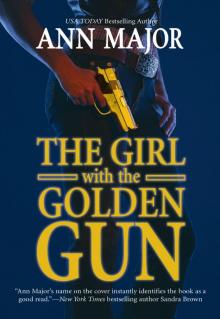 The Girl with the Golden Gun
The Girl with the Golden Gun Silhouette Christmas Stories
Silhouette Christmas Stories To Tame Her Tycoon Lover
To Tame Her Tycoon Lover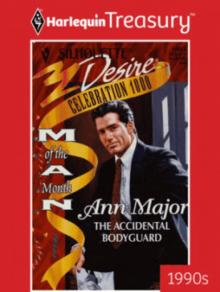 The Accidental Bodyguard
The Accidental Bodyguard Ultimatum: Marriage
Ultimatum: Marriage Marriage at the Cowboy's Command
Marriage at the Cowboy's Command Children of Destiny Books 4-6 (Texas: Children of Destiny Book 10)
Children of Destiny Books 4-6 (Texas: Children of Destiny Book 10)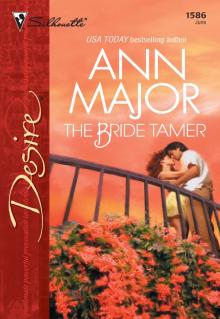 The Bride Tamer
The Bride Tamer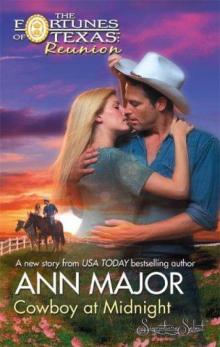 Cowboy at Midnight
Cowboy at Midnight Her Pregnancy Secret
Her Pregnancy Secret Children of Destiny Books 1-3 (Texas: Children of Destiny Book 9)
Children of Destiny Books 1-3 (Texas: Children of Destiny Book 9) Terms of Engagement
Terms of Engagement The Accidental Bridegroom
The Accidental Bridegroom A Scandal So Sweet
A Scandal So Sweet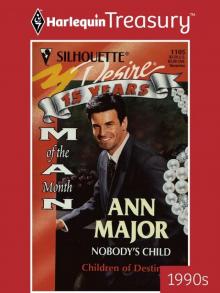 Nobody's Child
Nobody's Child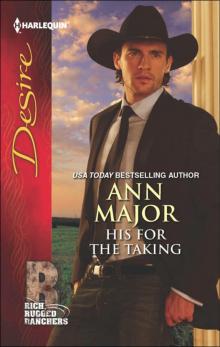 His for the Taking
His for the Taking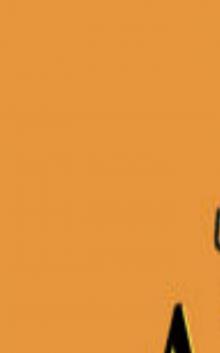 The Girl with the Golden Spurs
The Girl with the Golden Spurs